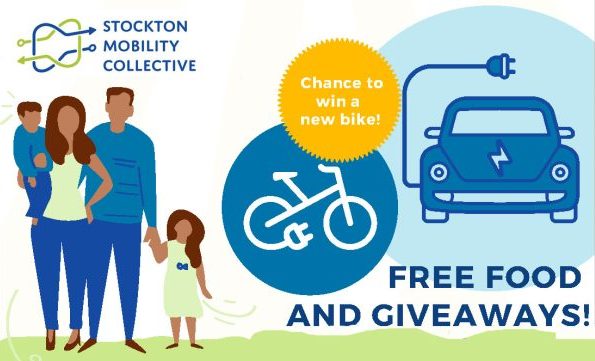Note: GJEL Accident Attorneys regularly sponsors coverage on Streetsblog San Francisco and Streetsblog California. Unless noted in the story, GJEL Accident Attorneys is not consulted for the content or editorial direction of the sponsored content.
Stockton has been the recipient of several state grant programs aimed at helping create more sustainable, equitable, and healthy communities. One of those grants, for $7.4 million from the Sustainable Transportation Equity Project (STEP), was awarded in late 2020 by the Air Resources Board.
In the first year of the grant, the San Joaquin Council of Governments (SJCOG) formed the Stockton Mobility Collective and began investigating what residents of disadvantaged areas of the city needed to help them get around and to replace car trips.
After a year of preparation, the Stockton Mobility Collective (SMC) will hold its first public event on Saturday, March 26, to invite residents to see how plans are progressing and to weigh in on shaping them.
At the event, from 11 a.m. to 3 p.m. at Conway Homes, 741 Flint Ave. in Stockton, local residents will have the opportunity to test-ride e-bikes, sign up to help beta test an electric car-share program, learn about driving and plugging in electric vehicles, and let planners know where they think bike-share and car-share hubs should be placed. There will be free food, and two bikes will be raffled off.
The Stockton Mobility Collective is focusing on six approaches to help increase sustainable mobility for residents of some of Stockton's disadvantaged areas:
- Community engagement to inform the design of the projects as well as promote the services and encourage community members to use them.
- Vamos, an existing transportation information app. Project developers hope to incorporate some of the SMC's new projects into the app, as well as expand existing mobile ticketing services south into Stanislaus county.
- E-car share, which will deploy thirty electric vehicles at five to seven stations in Stockton, in collaboration with Míocar, a nonprofit, affordable electric car-share program already serving several Central Valley towns.
- E-bike-share, in partnership with the San Joaquin Regional Transit District. The system will start with a pilot of 100 bikes at twelve to fifteen stations.
- Workforce development. "Shared mobility is new here," said Christine Corrales, Senior Regional Planner with SJCOG, who is overseeing the SMC. "There's no local workforce prepared to maintain or service these new programs, so the idea here is to prepare a pipeline for local workers for both the e-bike share and e-car share, as well as to train people to work in EV maintenance more broadly."
- Incentives to reduce the cost burden to income-qualifying residents and encourage them to take advantage of the shared mobility options. While rates are not yet set, current rates for the Míocar services in the San Joaquin Valley are around $4 an hour or $35 day. Funding will help low-income residents access these clean mobility choices.
Saturday's event marks the beginning of implementation for all of these projects. During 2022, SJCOG will be finishing up the program designs, gathering community input, and raising community awareness of the projects. Saturday will also be an opportunity to educate people about how shared mobility works. "For folks in Stockton, this is a new kind of service," said Corrales.
The SMC team is working in parallel with teams at the city of Stockton working under another grant, the Transformative Climate Communities (TCC) grant, received from the Strategic Growth Council in 2020. That grant, for $10.8 million, is helping advance the "Stockton Rising" Sustainable Neighborhood Plan, and offers a number of resources for residents such as "green workforce" training, support to create edible gardens, solar installations, and urban greening.
Representatives from some of those programs will be at Saturday's event. Little Manila Rising will be planting trees, and Grid Alternatives will be there to promote its residential solar program.
The TCC grant also supported a complete streets project on Miner Avenue in downtown Stockton, connecting to the transit center and a rail station. That just-completed project includes a road diet, buffered bike lanes, accessible sidewalks, and street trees, connecting downtown to nearby communities to make bike riding safer and more comfortable, and thus further increasing the usefulness of bike-share as a transportation option.
This first pilot for the Stockton Mobility Collective is focused on the city of Stockton, but SJCOG is looking to see how it could be expanded to other parts of the region later. The STEP grant goes through 2024, so they have a couple of years to run and test the pilot - and to figure out how to fund the projects going into the future.






